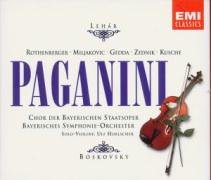| All Artists: Lehar, Paganini, Rothenberger, Boskovsky Title: Paganini (Comp) Members Wishing: 0 Total Copies: 0 Label: EMI Classics Imports Original Release Date: 1/1/1977 Re-Release Date: 10/24/2000 Album Type: Import Genre: Classical Style: Opera & Classical Vocal Number of Discs: 2 SwapaCD Credits: 2 UPC: 724356596825 |
Search - Lehar, Paganini, Rothenberger :: Paganini (Comp)
 | Lehar, Paganini, Rothenberger Paganini (Comp) Genre: Classical
|
Larger Image |
CD Details |
CD ReviewsLehar's Swan Song: A Gorgeous Operetta Rudy Avila | Lennox, Ca United States | 02/21/2004 (5 out of 5 stars) "Franz Lehar was an expert Viennese operetta composer, his most famous being "The Merry Widow". His last operetta was "Paganini", dating from the 1920's when he died. This recording is sublime and showcases the talents of all its singers, primarily tenor Nicolai Gedda and soprano Anneliese Rothenberger. It's a gorgeous album that has some of the most beautiful German singers of the 1950's and 1960's, and the quality of the music is top-notch. It's hard to believe no one's reviewed this. I'm proud to be the first. Light opera became the vogue of Vienna musical theatre in much the same way that Gilbert and Sullivan operettas were popular at London's Savoy or the works of French composer Jacques Offenbach in the Opera Bouffes in Paris. They were light-hearted, simple stories that ended happily and thus were comedies, beautiful music and arias that were easy to sing and audiences could hum as they walked out the theatre. The German language was never more beautiful than it was in Viennese operetta. The greatest composer of these light operas was Johann Strauss (Die Fledermaus, Vienna Blood, A Night In Venice, The Gypsy Baron) but also making their mark was Franz Von Suppe and Daniel Auber.Paganini tells the story of the supposed romantic affair between Napoleon's sister and the virtuoso violinist Niccolo Paganini. This may or may not have actually happened. It is accurate in that during Napoleon's day, Paganini was impressing and even frightening audiences with his mastership of the violin. He could play the violin so rapidly and fiercely that it seems as if he were possessed by the Devil (and some claimed he had been bestowed his talents by the Devil with whom he had made a Faustian bargain) his virtuoso trills on the violins and vivace movments could really excite the crowds while the pianissimo, adagio movements could become so melancholy he moved audiences to tears. The libretto may not be anything important, since it is a romantic comedy anyhow but the singers really deliver their best. Beautiful ensembles, trios, duets, arias and music which can only come from Franz Lehar himself.Anneliese Rothenberger was without a doubt the greatest German soprano ranking next to the more famous Elizabeth Schwartzkopff. Rothenberger's was well-trained in everything German - from Mozart heroines like Constanza from "Abduction Of The Seraglio" to Pamina in The Magic Flute, the Johann Strauss operetta heroines, Richard Strauss' Arabella and Sophie in Der Rosenkavalier and mastered the role of Marie in Alban Berg's Wozzeck as well as Lulu and even performed in the new operas of the 20th century, like Rolf Liebermann's "School For Wives" and "Penelope". or Heinrich Sutermeister's "Madame Bovary". Nicolai Gedda seemed to be her male counterpart, as he was prolific in his tenor's repertoire- from the Italian roles of Alfredo in Verdi's Violetta, to Des Grieux in the French opera Manon by Jules Massenet, and even the Russian-sung Eugene Onegin of Tchaikovsky. So for a good price, you get two great singers performing at the top of their game in lighter work for opera."
|

 Track Listings (20) - Disc #1
Track Listings (20) - Disc #1